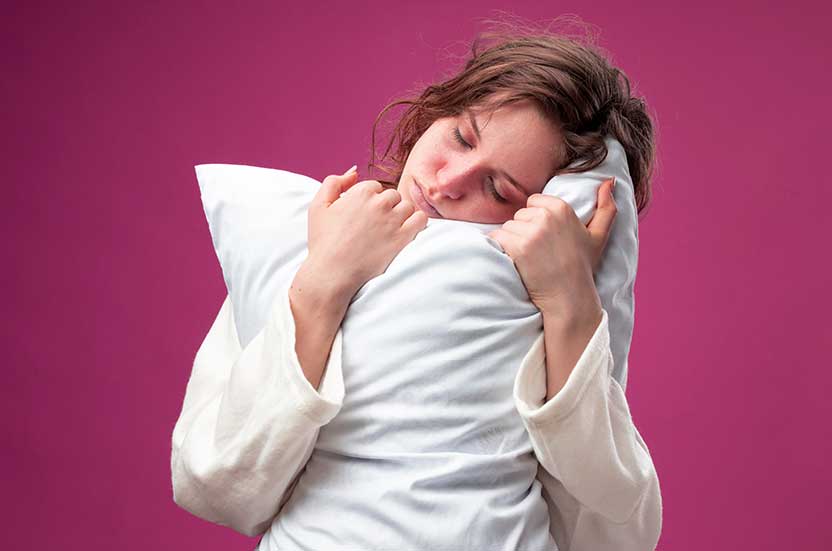How Does Sleep Affect Hair Health and Cause Hair Loss?

A good night’s sleep is essential for overall health, but did you know that it also plays a vital role in maintaining strong and healthy hair? Poor sleep patterns can contribute to hair loss and slow hair growth. Understanding how sleep impacts hair follicles, hormone regulation, and scalp health can help you take better care of your hair while improving your overall well-being. In this article, we’ll explore the relationship between sleep and hair health and provide practical tips for maintaining luscious locks.
The Science Behind Sleep and Hair Growth
1. Sleep and Hair Follicle Regeneration
Hair follicles follow a natural growth cycle, which includes three phases: anagen (growth phase), catagen (transition phase), and telogen (resting phase). During deep sleep, the body goes through repair and regeneration processes, including hair follicle recovery. Poor sleep can interrupt this cycle, leading to excessive shedding and hair thinning.
2. Hormonal Balance and Hair Health
The body’s hormonal balance is directly linked to sleep quality. Melatonin, a hormone responsible for regulating sleep, also supports hair growth. Insufficient sleep reduces melatonin production, which may weaken hair follicles and slow down hair regeneration. Additionally, sleep deprivation increases cortisol levels (the stress hormone), which can trigger hair shedding and worsen conditions like alopecia.
3. Blood Circulation and Nutrient Supply
Healthy hair growth depends on adequate blood circulation to the scalp. While sleeping, the body enhances blood flow, ensuring essential nutrients reach hair follicles. Chronic sleep deprivation reduces circulation, depriving hair of necessary vitamins and minerals like biotin, zinc, and iron, leading to brittle and weak hair.
How Lack of Sleep Contributes to Hair Loss
1. Increased Stress and Hair Shedding
Lack of sleep elevates stress levels, which can result in hair loss conditions such as telogen effluvium. In this condition, hair prematurely enters the shedding phase due to excessive stress. If sleep deprivation continues, it may lead to long-term hair thinning.
2. Scalp Health Deterioration
Poor sleep weakens the immune system, making the scalp prone to infections, inflammation, and dandruff. A compromised scalp environment affects hair follicles, causing irritation, slow hair growth, and potential hair loss.
3. Disrupting the Body’s Repair Mechanisms
Sleep is the body’s time to heal and regenerate. Inadequate rest slows down tissue repair, including that of hair follicles and the scalp. This can weaken hair roots, making them more prone to breakage and thinning.
Tips for Improving Sleep to Enhance Hair Health
1. Maintain a Consistent Sleep Schedule
Aim for 7–9 hours of quality sleep per night. Going to bed and waking up at the same time daily helps regulate your circadian rhythm, supporting overall hair health.
2. Create a Relaxing Bedtime Routine
Avoid screens before bed, practice relaxation techniques like deep breathing, and limit caffeine intake in the evening. A calm mind leads to better sleep, which benefits your hair growth cycle.
3. Keep Your Scalp and Hair Healthy Before Sleep
Use a silk or satin pillowcase to prevent hair breakage and reduce friction. Massaging your scalp with natural oils like rosemary or lavender before bed can also promote blood circulation and relaxation.
4. Eat a Balanced Diet
Consume foods rich in proteins, vitamins, and minerals that support hair health, such as leafy greens, nuts, fish, and eggs. Proper nutrition enhances hair strength and minimizes hair loss due to sleep deficiencies.
Learn More: What Foods Stop Hair Fall?
5. Manage Stress Levels
Since stress and sleep deprivation go hand in hand, practice mindfulness, meditation, or gentle exercise to keep stress levels low and support healthy hair growth.
Conclusion
Sleep is a crucial factor in maintaining healthy hair. It influences hair follicle regeneration, hormone levels, blood circulation, and overall scalp health. Chronic sleep deprivation can contribute to hair loss, thinning, and breakage. By prioritizing quality sleep and adopting healthy bedtime habits, you can significantly improve your hair’s strength and appearance while promoting overall well-being.
By ensuring proper rest and making small lifestyle changes, you can support healthier, fuller hair naturally!
FAQs
1. How many hours of sleep is needed for hair growth?
Experts recommend 7–9 hours of sleep per night for optimal hair growth and overall health. Consistent sleep patterns help regulate hormones and improve blood circulation, ensuring hair follicles receive proper nourishment.
2. Can lack of sleep cause permanent hair loss?
In most cases, sleep deprivation causes temporary hair loss due to stress and hormonal imbalance. However, if poor sleep continues for an extended period, it may lead to long-term hair thinning and conditions like chronic telogen effluvium.
3. What are the best foods to eat for better sleep and hair health?
Foods rich in magnesium, melatonin, and protein, such as almonds, bananas, salmon, and dairy products, support better sleep and promote healthy hair growth. Staying hydrated and maintaining a balanced diet also contribute to strong and vibrant hair.



